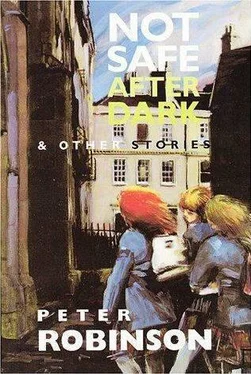Banks shrugged. ‘It could have turned out any way, really. There was no way of knowing accurately what would happen, and certainly there was a chance that either you would die or the blame would fall on you. As it turned out, Anna absorbed most of it, and she had asthma. In Owen’s twisted mind, he wanted your love-making to make you sick. That was his statement, if you like, after suffering so long in silence, pretending it was OK that Anna had moved on. But that’s all. It was a sick joke, if you like. We found three poisoned condoms. Certainly if one hadn’t worked the way it did, there could have been a build up of the pesticide, causing chronic problems. I did read about a case once,’ Banks went on, ‘where a man married rich women and murdered them for their money by putting arsenic on his condoms, but they were made of goatskin back then. Besides, he was French. I’ve never come across a case quite as strange as this.’
Billings shook his head slowly. ‘Can I go now?’ he asked.
‘Where to?’
‘I don’t know. A hotel, perhaps, until…’
Banks nodded and stood up. As they went down the stairs, they came face to face with Owen Doughton, handcuffed to a large constable. Billings stiffened. Doughton glared at him and spoke to Banks. ‘He’s the one who killed her,’ he said, with a toss of his head. ‘He’s the one you should be arresting.’ Then he looked directly at Billings. ‘You’re going to have to live with that, you know, Mr Moneybags. It was you who killed her. Hear that, Mr Yuppie Moneybags? You killed her. You killed Anna.’
Banks couldn’t tell whether he was laughing or crying as the constable led him down to the cells.
People go missingall the time in war, of course, but not usually nine-year-old boys. Besides, the war had hardly begun. It was only 20 September 1939 when Mary Critchley came hammering on my door at about three o’clock, interrupting my afternoon nap.
It was a Wednesday, and normally I would have been teaching the fifth-formers Shakespeare at Silverhill Grammar School (a thankless task if ever there was one), but the Ministry had just got around to constructing airraid shelters there, so the school was closed for the week. We didn’t even know if it was going to reopen because the plan was to evacuate all the children to safer areas in the countryside. Now I would be among the first to admit that a teacher’s highest aspiration is a school without pupils, but in the meantime the government, in its eternal wisdom, put us redundant teachers to such complex, intellectual tasks as preparing ration cards for the Ministry of Food. (After all, they knew what was coming.)
All this was just a small part of the chaos that seemed to reign at that time. Not the chaos of war, the kind I remembered from the trenches at Ypres in 1917, but the chaos of government bureaucracies trying to organize the country for war.
Anyway, I was fortunate enough to become a Special Constable, which is a rather grandiose title for a sort of part-time dogsbody, and that was why Mary Critchley came running to me. That and what little reputation I had for solving people’s problems.
‘Mr Bashcombe! Mr Bashcombe!’ she cried. ‘It’s our Johnny. He’s gone missing. You musht help.’
My name is actually Bascombe , Frank Bascombe, but Mary Critchley has a slight speech impediment, so I forgave her the mispronunciation. Still, with half the city’s children running wild in the streets and the other half standing on crowded station platforms clutching their Mickey Mouse gas-masks in little cardboard boxes, ready to be herded into trains bound for such nearby country havens as Graythorpe, Kilsden and Acksham, I thought perhaps she was overreacting a tad, and I can’t say I welcomed her arrival after only about twenty of my allotted forty winks.
‘He’s probably out playing with his mates,’ I told her.
‘Not my Johnny,’ she said, wiping the tears from her eyes. ‘Not since… you know…’
I knew. Mr Critchley, Ted to his friends, had been a Royal Navy man since well before the war. He had also been unfortunate enough to serve on the aircraft carrier Courageous , which had been sunk by a German U-boat off the south-west coast of Ireland just three days before. Over five hundred men had been lost, including Ted Critchley. Of course, no body had been found, and probably never would be, so he was only officially ‘missing in action’.
I also knew young Johnny Critchley, and thought him to be a serious boy, a bit too imaginative and innocent for his own good. (Well, many are at that age, aren’t they, before the world grabs them by the balls and shakes some reality into them.) Johnny trusted everyone, even strangers.
‘Johnny’s not been in much of a mood for playing with his mates sinsh we got the news about Ted’s ship,’ Mary Critchley went on.
I could understand that well enough – young Johnny was an only child, and he always did worship his father – but I still didn’t see what I could do about it. ‘Have you asked around?’
‘What do you think I’ve been doing sinsh he didn’t come home at twelve o’clock like he was supposed to? I’ve ashked everyone in the street. Last time he was seen he was down by the canal at about eleven o’clock. Maurice Richards saw him. What can I do, Mr Bashcombe? Firsht Ted, and now… now my Johnny!’ She burst into tears.
After I had managed to calm her down, I sighed and told her I would look for Johnny myself. There certainly wasn’t much hope of my getting the other twenty winks now.
•
It was a glorious day, so warm and sunny you would hardly believe there was a war on. The late afternoon sunshine made even our narrow streets of cramped brick terraced houses look attractive. As the shadows lengthened, the light turned to molten gold. First, I scoured the local rec, where the children played cricket and football, and the dogs ran wild. Some soldiers were busy digging trenches for air-raid shelters. Just the sight of those long, dark grooves in the earth gave me the shivers. Behind the trenches, barrage balloons pulled at their moorings on the breeze like playful porpoises, orange and pink in the sun. I asked the soldiers, but they hadn’t seen Johnny. Nor had any of the other lads.
After the rec, I headed for the derelict houses on Gallipoli Street. The landlord had let them go to rack and ruin two years ago, and they were quite uninhabitable, not even fit for billeting soldiers. They were also dangerous and should have been pulled down, but I think the old skinflint was hoping a bomb would hit them so he could claim insurance or compensation from the government. The doors and windows had been boarded up, but children are resourceful, and it wasn’t difficult even for me to remove a couple of loose sheets of plywood and make my way inside. I wished I had my torch, but I had to make do with what little light slipped through the holes. Every time I moved, my feet stirred up clouds of dust, which did my poor lungs no good at all.
I thought Johnny might have fallen or got trapped in one of the houses. The staircases were rotten, and more than one lad had fallen through on his way up. The floors weren’t much better, either, and one of the fourth-formers at Silverhill had needed more than fifteen stitches a couple of weeks before when one of his legs went right through the rotten wood and the splinters gouged his flesh.
I searched as best I could in the poor light, and I called out Johnny’s name, but no answer came. Before I left, I stood silently and listened for any traces of harsh breathing or whimpering.
Nothing.
After three hours of searching the neighbourhood, I’d had no luck at all. Blackout time was seven forty-five p.m., so I still had about an hour and a half left, but if Johnny wasn’t in any of the local children’s usual haunts, I was at a loss as to where to look. I talked to the other boys I met here and there, but none of his friends had seen him since the family got the news of Ted’s death. Little Johnny Critchley, it seemed, had vanished into thin air.
Читать дальше










![Джеймс Чейз - Not Safe to Be Free [= The Case of the Strangled Starlet]](/books/417649/dzhejms-chejz-not-safe-to-be-free-the-case-of-the-thumb.webp)

